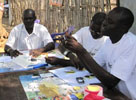
In a debate today on the BBC call-in show “Africa Have Your Say,” callers from many African countries shared their views on the prospect of southern independence and reflected on issues facing the possible state and broader region. The viability of a southern Sudanese state has been on the minds of many in the years since the signing of the Comprehensive Peace Agreement in 2005, but has become all the more pressing in the run-up to national elections in April and the 2011 referendum on southern independence.
Callers widely spoke in favor of southern secession, despite the clear challenges that a new state would face, but dissension was not lacking. Interestingly, the opinions mirror many of the arguments made by Sudan’s political elite, from both the North and the South.
Here’s a small selection of the comments made on today’s show:
“Secession in Sudan would flare up conditions in Nigeria [such as divisions amongst religious groups throughout the country] (…) but yes, the South should be independent.” – Nigerian caller
“Independence will complicate issues further…issues [including oil, intermarriages] need to be sorted out (…) before separation.” – Kenyan caller
“People have been suffering, people in Khartoum neglect South Sudan…[the] South needs to take the land that was given to them. (…) [The] North never built a school, hospital, anywhere in country.” – Southern Sudanese caller
“[The] South is already on the brink of civil war (…) unity of [the] South will break apart and groups will be marginalized by others. (…) [The] South has a responsibility to make unity look attractive.” – Northern Sudanese caller
The BBC debate closed with a call to Edward Thomas, author of a new Chatham House report on the next year of milestones in Sudan. He made the important point that the leaders of Sudan must “listen to the lessons of the region” when determining how to manage the prospect of secession and southern independence. Thomas also underscored the need for the international community to support the election and referendum, and for international observers to monitor both processes. At this critical juncture, vigilant international monitoring is more important than ever.
Photo: Voter registration booth, Juba (Enough/Maggie Fick)

